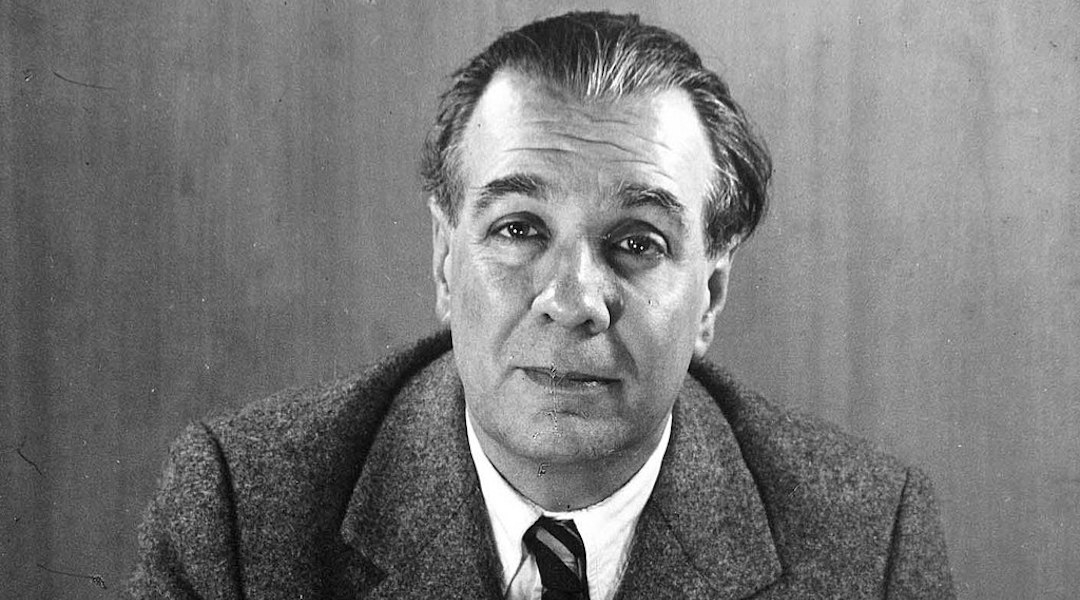(JTA) — Argentine writer Jorge Luis Borges is best known for his complex, surrealist short stories and poems. Few know he was a great admirer of Israel and the Jewish people.
This side of the acclaimed author is revealed in “Borges, Judaism and Israel,” a new book that includes some of his writings, photos and unpublished letters. It debuted this week at the Buenos Aires Book Fair at a panel with academic lecturers and Borges’ widow, Maria Kodama. Its publication was timed to commemorate 50 years since Borges made his first trip to Israel and his 120th birthday.
Borges had a surprising number of Jewish connections. His English grandmother, Fanny Haslam, was an expert on the Hebrew Bible.
“I think my passion for Israel comes from my English grandmother. She was a Protestant, which means that she was a reader of the Bible,” Borges once said. “That is to say that I grew up a bit in a biblical environment, which is to say in a Jewish environment.”
Borges also established close ties with many Jewish friends and colleagues, including two he met while studying at Calvin College in Geneva: Simon Jichlinki and Maurice Abramowicz, with whom he would remain friends throughout his life.
Borges was born Jorge Francisco Isidoro Luis Borges Acevedo, and the book includes a prologue from Kodama in which she reveals a letter from Borges to Abramovich acknowledging the surname Acevedo is associated with Sephardic Jews — that is, those with roots in Spain.
“I don’t know how to celebrate this stream of Jewish blood that runs through my veins,” Borges wrote to his friend.
On Oct. 16, 1966, Borges, then already visually impaired (he would go fully blind at age 55), sent a letter to David Ben-Gurion, Israel’s first prime minister.
“Perhaps you do not ignore the affinity that I have always felt for your admirable people,” he wrote.
Borges, a big admirer of Jewish writers such as Baruch Spinoza, Martin Buber, S.Y. Agnon and Gershom Scholem, added: “I also believe that beyond the hazards of blood, we are all Greeks and Hebrews.”
Borges, who was not religious but interested in several different religions, visited Israel in 1969 and 1971. On his first visit, he was a guest of the government because of his friendship with Ben-Gurion.
Just after that visit, Borges wrote a poem titled “Israel, 1969.” In 1971, Borges was in Jerusalem to receive the highest literary award bestowed by Israel, the Jerusalem Prize.
The books’ 246 pages include chapters on “Israel,” “Judaism,” “Kabbalah,” “Spinoza,” “Sefarad” and “Jewishness” — all related to how these issues showed up in Borges’ works.
On Monday, Argentine Vice President Gabriela Michetti participated in an event at the book fair in which the Israeli company Orcam donated a device that helps blind people read. The device was tested with the book about Borges and Israel as the vice president tweeted to her million followers.
The book is co-edited by the Argentine center for the study of Sephardic culture, Cidicsef, and the Israeli Embassy.
“In 1986 we started the first investigation into the issue of Borges and Israel in our magazine Sefardica. Now we present our investigation in a new format,” said an emotional Mario Cohen, the president of Cidicsef.
“‘Borges chai vekayam!'” he said — in Hebrew, Borges is alive and endures.
JTA has documented Jewish history in real-time for over a century. Keep our journalism strong by joining us in supporting independent, award-winning reporting.






